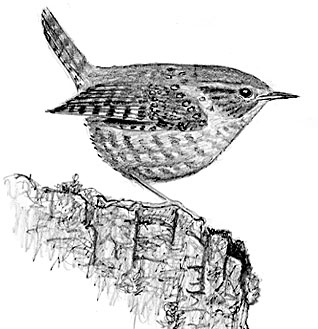
Dear Bird Folks,
I really don’t have a question for you, but I’d like to share a wonderful birding experience that I just had. I have recently moved into senior housing in Orleans and have missed the birds that I once had in my yard in Eastham. However, that all changed today when, just outside of my slider, I saw a bird that I had never seen before. It was a tiny, little, energetic, brown bird, which, according to my bird book, was a Winter Wren. I was thrilled. The bird didn’t stay long but it made my day. Thanks for listening,
-Ann, Orleans
You are welcome Ann,
But you don’t have to thank me for listening to a story about a Winter Wren, or any bird for that matter. I could never hear enough bird stories. Squirrel stories on the other hand are something else again. Every day I have to listen to the same old grumblings over and over. I can’t even fake interest in those anymore. I know someday it’s going to backfire on me when someone tells me that a squirrel has just robbed the local bank and used my car to make its getaway. And I’ll say, without ever listening to a single word, “Hey, that’s great. Have a nice day.” Man, won’t I feel silly when I can’t find my car at the end of the day. That will teach me not to pay attention.
You should be excited about seeing a Winter Wren. You are one of the very few who will see one around here this year. It’s not that these birds are endangered or anything, but they are reclusive birds and hard to find, even when you are looking for them. Typically they inhabit dense, damp woods and are not likely to be found in our backyards. In addition, they are just as you described them, “tiny, little.” When a bird is both tiny and little at the same time, they are very small indeed. From the tip of its beak to the tip of its tail this wren is a meager 4″ long, making it smaller than a chickadee. Even its entire wingspan is only 1″ longer the miniscule Ruby-throated Hummingbirds’. And let’s not forget about the bird’s color which is a drab, cryptic, dull, brown. This is one tough bird to find, but you still managed to spot one. Buy a lottery ticket Ann, luck is on your side right now.
The first Winter Wren I ever saw was scurrying against the foundation of my house. I thought it was a mouse. When I walked over for a closer look, the mouse flew away. I thought, “What? A flying mouse?” (I wasn’t a very good birder in those days.) I have always wished that I had gotten a better look that day, because that was thirty years ago and I haven’t seen another one since. Although, after a party, I still see the occasional flying mouse.
True to it’s name the Winter Wren is largely a winter visitor to much of the United States. It breeds in a few northern states and across Canada. Here in Massachusetts, Winter Wrens can be found breeding in a few scattered locations, with most of their nest sites being in the Berkshires. On its breeding ground is where this secretive wren makes itself known to the world. You still may not be able to see it but you won’t have any trouble hearing it. It is said that the Winter Wren’s song is the loudest of all of our songbirds, when compared to its size. If you factor in the weight, this tiny bird can sing ten times louder than a rooster can crow. I don’t know who figures this stuff out, but I’m willing to take their word for it if it makes my point more dramatic. And speaking of drama, check this out.
The little Winter Wren spends most of its life creeping on or near the ground where it is fearless in search of a meal. Its scientific name, Troglodytes, troglodytes, meaning “cave-dweller,” fits this bird perfectly. There is no dark hole, no shadowy abyss, no creepy cranny, or cobweb-covered tunnel that this bird won’t enter. Oftentimes it will disappear into the black for several moments, only to emerge with either a mouthful of food or an upset family of Hobbits chasing after it.
Oddly enough, the wren that is so difficult to see here in North America, is the same wren that brightens people’s gardens in England. Yes, the bird that the Brits call “Jenny Wren,” or just plain wren, is the same reclusive bird we call Winter Wren. Only in England (and other parts of Europe) their wren is amazingly friendly and not shy at all. Go figure. Must be something in the tea.
Congrats on seeing your first Winter Wren, Ann. I hope you see many more. Feel free to share a bird story with me anytime. However, I’d rather not hear any stories about squirrels, unless it’s to tell me what the squirrel did with my car.